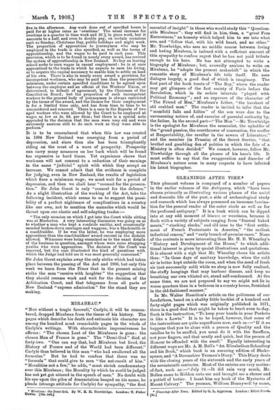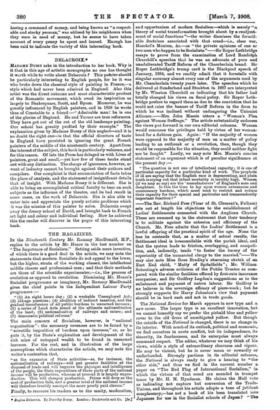GLEANINGS AFTER TIME.*
Tnis pleasant volume is composed of a number of papers in the earlier volumes of the Antiquary, which "have been chosen primarily as illustrating various phases of the social and domestic life of the past, a side of archaeological study and research which has always possessed an immense fascina- tion for the general reader of the outer circle as well as for the professed antiquary." It is a book which can be dipped into at any odd moment of leisure or weariness, because it deals with a variety of subjects ranging from "funeral baked meats," "stocking clocks," and old inns to the "first settle- ment of French Protestants in America," "the earliest industrial census," and "early breach-of-promise cases." None of the contents is more interesting than Mr. H. B. Wheatley's "History and Development of the House," to which addi- tional interest is given by quaint illustrations and quotations. It is almost with a sigh that Mr. Wheatley closes his article thus: "In these days of sanitary knowledge, when the cold air is better kept outside the room, and when the need of fresh air (not necessarily cold) while we sleep is now fully realised, the stuffy hangings that may harbour disease, and keep us breathing our own vitiated air, stand self-condemned. At the same time, we are not prepared to say we might not lie in worse quarters than in a bedroom in a country house, furnished in the old-fashioned manner."
In Mr. Walter Hamilton's article on the politeness of our forefathers, based on a shabby little booklet of a hundred and forty-eight pages which was originally published in 1671,. there is a good deal that might be taken to heart even to-day. Such is the instruction, "To keep your hands in your Pockets is like a Lowte." It is to be hoped, however, that some of the instructions are quite superfluous now, such as :—" If it so happens that you be alone with a person of Quality and the candles be to be snuffed, you must do it with the Snuffers, not your fingers, and that neatly and quick, lest the person of Honour be offended with the smell." Equally interesting in different ways are Mr. A. M. Bell's "An. Elizabethan Schoolboy and his Book," which book is an amusing edition of Shake- speare, and "A Devonshire Yeoman's Diary." This Diary deals with the closing years of the sixteenth and the early years of the seventeenth centuries. Most of the entries are very matter- of-fact, such as :—"July 24.—It did rain very much, Mr. Baez' came to Riddon unto me and brought me a cheese and a pottell of butter. I leant him my book of the Mysteries of Mount Calvary." The yeoman, William Honnywell by name, • Meanings After Tune. Edited by G. L. Apporson. London; Elliot Stock. (Sal
having a command of money, and being known as "a respect- able and stocky yeoman," was utilised by his neighbours when they were in need of money, but he seems to have taken account of every penny he spent and loaned. Enough has been said to indicate the variety of this interesting book.















































 Previous page
Previous page